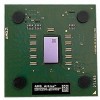AMD 2600 User Guide - Page 21
Using TV Display and Capture Features, Viewing the PC’s Display on TV or HDTV
 |
UPC - 683728097530
View all AMD 2600 manuals
Add to My Manuals
Save this manual to your list of manuals |
Page 21 highlights
15 Using TV Display and Capture Features These topics describe how to use the TV display and video capture features of your graphics card. • Viewing the PC's Display on TV or HDTV on page 15. • Connecting to a TV, VCR, or HDTV on page 16. • Capturing Video on page 28. • Avivo™ Video Converter on page 31. Viewing the PC's Display on TV or HDTV The graphics card has TV out capability. You can attach the graphics card to a TV and a monitor at the same time. If your graphics card has video input capability, you can also connect it to a VCR and record the monitor's display. Warning! IMPORTANT INFORMATION for European Customers. Some PC monitors in Europe cannot be used simultaneously with TV display. When you enable TV display in Europe, the refresh rate for the monitor and TV is set to 50 Hz. Some monitors may not support this refresh rate and could be damaged. Check the documentation supplied with the monitor to see if the monitor supports a refresh rate of 50 Hz. If the monitor does not support 50 Hz (or if you are not sure), do not use your monitor as a secondary display. TV display is useful for giving presentations and watching movies, or playing games on a screen larger than a typical monitor. The following tips will help you get the most out of the TV out feature. Using a Monitor vs. Using TV Display Using the TV as the primary computer display can be useful; however, the display on the monitor may change or looked squashed. This distortion occurs because the display adjusts to fit the dimensions of the TV. To correct the monitor display, use the monitor control buttons to adjust its display size and position. Some single-frequency monitors may not work with TV display enabled. If you experience problems when TV display is enabled, disable TV display to restore the monitor's display.















